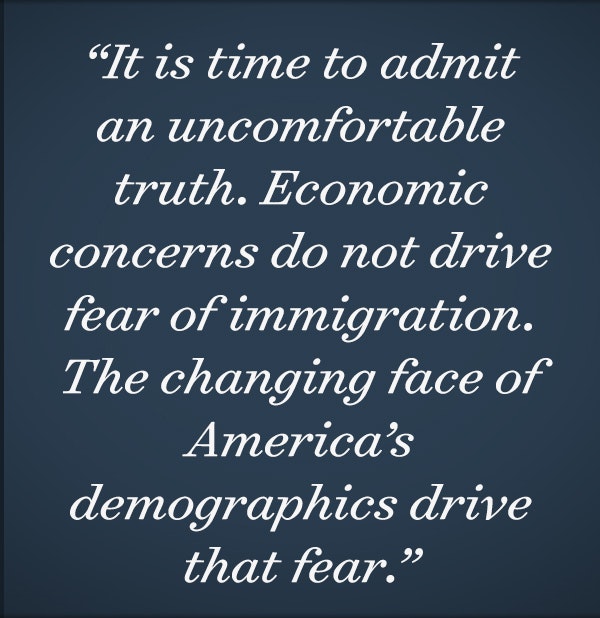What Are We So Afraid of When It Comes to Immigration?
Local and national voices weigh in on the immigration debate.

The Catalyst asked a variety of contributors to address the anxiety that surrounds the nation’s protracted immigration debate. We specifically asked people with differing opinions and backgrounds to answer this question since it’s hard to resolve any debate without knowing the contrasting views. That’s why we have invited immigrants and non-immigrants, national and local figures, religious and political leaders, writers and policymakers to take on this volatile topic.
Tim O’Hare
Chairman of the Tarrant County Republican Party in Texas and the former mayor of Farmers Branch, Texas
“People believe laws matter. We are a nation of laws. If immigration laws are ignored, then what other laws are we free to ignore?”
Read full article
Imam Shpendim Nadzaku
Resident Scholar of the Islamic Association of North Texas
“Immigration strikes at the very heart of a central metathesiophobia, or fear of change.”
Read full article
Mark Krikorian
Executive Director of the Center for Immigration Studies in Washington, D.C.
“Limiting immigration to spouses and minor children of citizens, plus a handful of genuine Einsteins and refugees who cannot be helped where they are, would still yield an immigration flow larger than any other country’s.”
Read full article
Ana Rodriguez
Director of the SMU Cox Latino Leadership Initiative
“It is time to admit an uncomfortable truth. Economic concerns do not drive fear of immigration. The changing face of America’s demographics drive that fear.”
Read full article
Mustafa Akyol
Author of Islam without Extremes: A Muslim Case for Liberty and The Islamic Jesus, is a contributing New York Times opinion writer and Senior Visiting Fellow at The Freedom Project at Wellesley College
“It is crucial, therefore, that America keeps up that great tradition of openness, and keeps being the beacon on the hill. If America rather falls for xenophobia, others will fall more easily.”
Read full article
Jeff Kim
Recent Baylor University graduate who works on the Bush Institute’s Human Freedom Initiative
“They live in constant fear of not knowing what’s going to happen to them. They also live in fear of having no voice or power to change what affects them the most.”
Read full article
Jannet Barrera
Gates Millennial Scholar and a Texas A&M University graduate who will enter the University of North Texas Public Health School this spring
“My family is everything to me, so losing all I have known would be hard. I would lose part of my identity. This keeps me up at night. I worry about them and losing them.”
Read full article
The Catalyst believes that ideas matter. We aim to stimulate debate on the most important issues of the day, featuring a range of arguments that are constructive, high-minded, and share our core values of freedom, opportunity, accountability, and compassion. To that end, we seek out ideas that may challenge us, and the authors’ views presented here are their own; The Catalyst does not endorse any particular policy, politician, or party.
